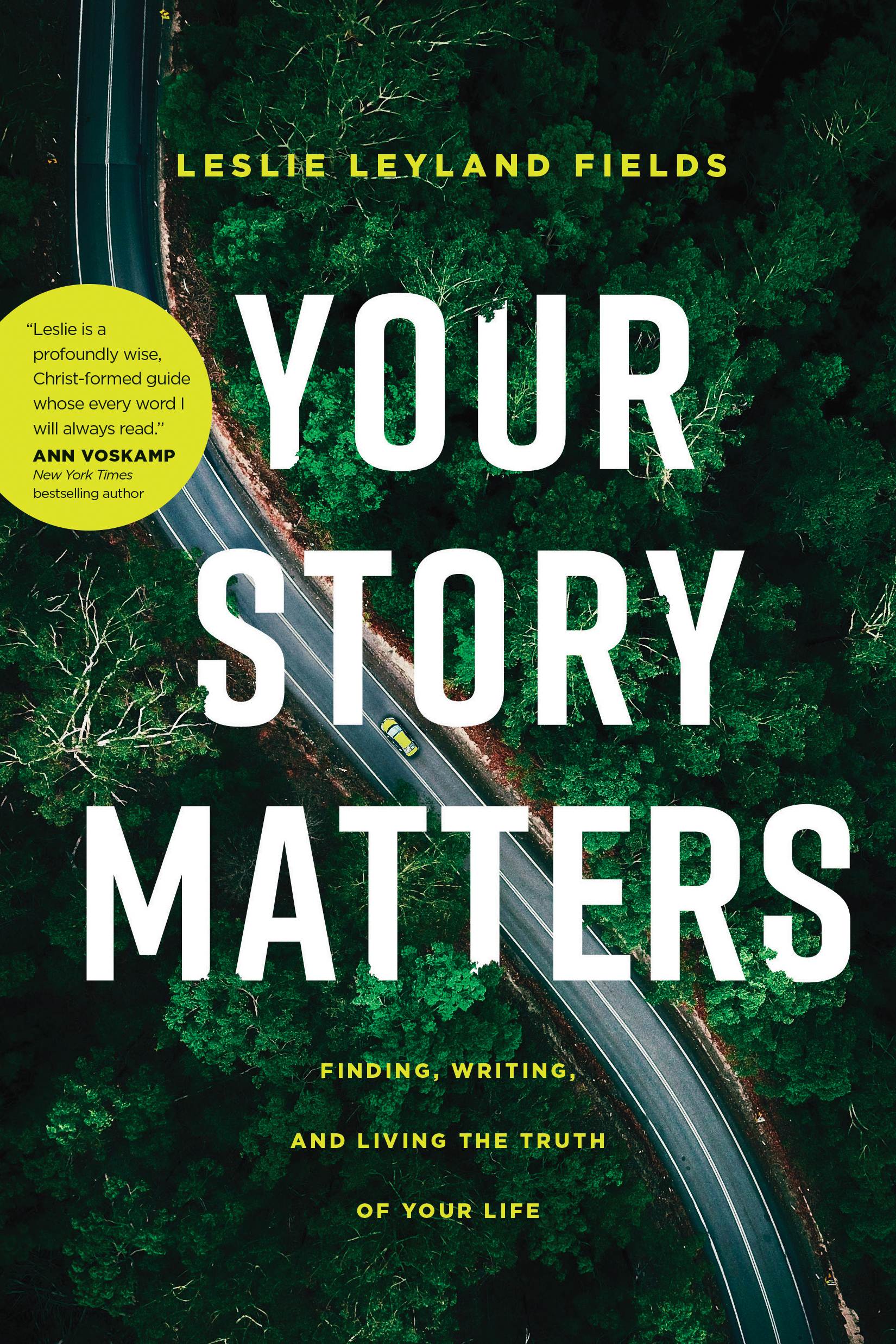Writing helps us notice what God notices. So write your story because God attends to every moment of your life, and you should too.
– Leslie Leyland Fields, Your Story Matters
By Christine McParland
“When did you first realize your story mattered?” The question snapped me out of my half-attentive state as I listened to a webinar led by author and teacher Leslie Leyland Fields. The conviction that my story matters is one I hold deeply, but I’d never thought about how I came to realize that truth. Nor could I imagine life without the daily awareness of a grander story arc, my mind constantly piecing together moments both mundane and extraordinary, anticipating where the narrative might lead next.
Coming to the realization that my story mattered is a story in itself, but the most important lesson I learned is that everyone has a story that needs to be told (including you). Why? Because paying attention to your story and sharing it will help you become the person you’re meant to be, encourage others to do the same, and connect you to the Author of all our stories.
1. Paying attention to your story will help you become the person you’re meant to be.
I started writing to process a mini crisis of faith I experienced after witnessing my grandfather’s final moments alive. My belief in God wasn’t shaken, but I didn’t know what to do with the reality of death as someone in her mid-20s with her whole life before her. How was I to live my one brief timespan on earth, pursuing goals and chasing dreams, knowing they would all someday end in dust?
My anguished thoughts wrestled themselves out of the whirlpool of my brain and onto my laptop screen, forming words I could look at more objectively. As I continued to process my grief through writing, I grew in my understanding of life, death, and the purpose of both. I learned that life is less about what I do—all those things that will cease when I draw my final breath—and more about who I become, the person who will stand before God on the other side of the grave and leave a legacy to those who follow behind me.

Slowly I began to heal and regain hope for the future in a way I wouldn’t have if I’d tried to rush through that chapter and bury the pain of my story.
What about you? Have you endured a season of suffering that you’ve never allowed yourself to process (or are you going through one now)? In her book Your Story Matters, Leslie Leyland Fields reminds us that, “When we don’t turn and look behind, we lose our way. Even our very selves.” But writing our stories, painful as they may be, can help us move on from the past and toward healing.
2. Writing and sharing your story can help others find hope, encouragement, and healing.
Encouraged by the healing I experienced from writing my story, I was inspired to share it with others who might benefit from what I’d learned. I started a personal blog and would usually get a few “likes” on the posts I shared, but rarely did I see a comment or some assurance that my story had actually impacted anyone.
But I continued writing, and one Christmas Eve I was humbled by a comment left on a post I’d published earlier that day. A childhood friend of my father’s—someone I’d never met or talked to before, but only knew through Facebook—thanked me for sharing. Apparently, the post had spoken to him in grieving the loss of his mother only a couple weeks prior.
How was it possible that something I’d written could encourage someone I didn’t even know in the moment of his need? That is the vulnerable power of story. By honestly sharing my own heartaches and hopes, it had offered hope to another. (This wouldn’t be the only time I’d receive a comment like this, either.)

Seeking personal healing had been enough motivation to start writing my story, but realizing it could help others on their own healing journey was the encouragement I needed to keep going.
Who might you be able to encourage by telling your story? How could doing so help others—and yourself—realize that none of us are alone in the trials and triumphs of life?
3. Writing your story can help you encounter its Great Author.
While I was familiar with the healing potential of stories, I never expected how powerfully I would encounter God through my story.
Scribbling in spiral notebooks and filling Word docs was about more than practicing a writing habit or recording the events of my life. The more I wrote about my story, the more I paid attention to it, looking for underlying themes and connecting the dots in my daily experience. What did it all mean? As I continued to write my story, I realized that I wasn’t the actual author of it. I was only bearing witness to a much greater story that God had been composing since before time began. The seemingly inconsequential and disconnected pieces of my life—from family funerals to conversations with customers to ballroom dance classes—have all somehow worked together to shape me into the person I’m becoming. And that person is learning to love God more with each unfolding chapter.
While God reveals himself to us through the created universe, the written Scripture, and ultimately in the person of Jesus Christ, he also reveals himself through our individual stories. And that’s ultimately why our stories matter.

What might God want to say to you through your life’s story? How might he be redeeming the painful chapters and preparing you for triumphant ones? In what ways is your story pointing you to the One who loves you and knows your story from beginning to end?
If you need more encouragement or inspiration to tell your story, check out this free webinar series by Leslie Leyland Fields, author of Your Story Matters.
You might be interested in
Your Story Matters by Leslie Leyland Fields
Your Story Matters presents a dynamic and spiritually formative process for understanding and redeeming the past in order to live well in the present and into the future. Leslie Leyland Fields has used and taught this practical and inspiring writing process for decades, helping people from all walks of life to access memory and sift through the truth of their stories. This is not just a book for writers. Each one of us has a story, and understanding God’s work in our stories is a vital part of our faith. Through the spiritual practice of writing, we can “remember” his acts among us, “declare his glory among the nations,” and pass on to others what we have witnessed of God in this life: the mysterious, the tragic, the miraculous, the ordinary. With a companion video curriculum from RightNow Media, this is a “why not” book as opposed to a “how to” book. Leslie asks each of us an important question: “Why not learn to tell your story, in the context of the grander story of God?”






1 Comments
Thank you for your inspirational article, Christine!